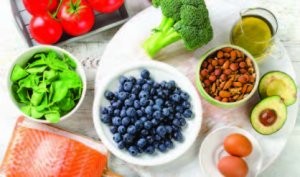
Let food be thy medicine and medicine be thy food. – Hippocrates
Food’s healing properties is a concept that stems back to the earliest days of medicine, but has taken on new significance as a natural way to prevent or manage today’s most devastating illnesses, from dementia to heart disease. The regimens presented below are not ‘diets’ in the traditional sense, but rather represent a shift to eating habits that preserve wellness.
DASH (Dietary Approaches to Stop Hypertension), a low-sodium diet that encourages consumption of foods rich in nutrients such as potassium and calcium magnesium that help lower blood pressure, prevent diabetes and support heart health.
The Mediterranean diet emphasizes fish, fruits, and vegetables, with olive oil as the main source of fat, has gained prominence for its link to stronger bones, a healthier heart and reduced blood pressure.
Combining both of the above, the MIND (Mediterranean-DASH Intervention for Neurodegenerative Delay) diet, from Rush University Medical Center, shows real promise in helping patients maintain cognition and reduce the risk of dementia. Seniors who rigorously adhered to the recommended foods lowered their risk for Alzheimer’s disease by 53 percent, but even those who followed it only moderately well experienced a 35 percent reduction, according to newly published research from the Health and Retirement Study. The focus is on eating ‘brain-healthy’ foods, including:
Green leafy vegetables, such as spinach or kale – at least six servings weekly
- Other vegetables – at least one serving daily
- Nuts
- Berries – at least twice weekly
- Beans – at least three servings weekly
- Whole grains – three servings daily
- Fish – at least once weekly
- Poultry – at least twice weekly
- Olive oil
- Wine – once daily, if desired
Excluded: red meat, butter, margarine, cheese, pastries, sweets, refined sugar or flour, and fried or fast food. Eggs and dairy are included but in small portions.
Additional research points to the role of a high quality diet in preserving brain health and maintaining cognition. However, MIND study lead author and nutritional epidemiologist Claire McEvoy, Phd, cautions that to conclusively prove the connection between diet and dementia risk, the next step is to conduct clinical trials. In the meantime, experts say there’s no harm in incorporating these foods into your daily diet, as they provide antioxidants, assist with maintenance of normal blood pressure levels and help keep chronic inflammation in check.
Other plans worth considering:
Weight Watchers: still a smart, effective diet after 54 years. It’s rated high by dietitians for ease of adherence, nutritional soundness, emphasis on group support, abundance of fruits and vegetables, and allowance for occasional indulgences.
Mayo Clinic Diet: consisting of a two-week jump start for weight loss, followed by a lifelong approach to diet and health, with information on food choices, portion sizes, menu planning and physical activity. The emphasis is on generous amounts of low-energy-dense foods that help you lose weight by feeling full on fewer calories, and includes whole-grain carbohydrates, lean sources of protein and unsaturated fats. At least 30 minutes of exercise is recommended daily. A typical 1200-calorie-a-day menu includes:
- Breakfast: 1/2 cup cooked oatmeal with 1 cup milk and 2 tablespoons raisins, 1/4 cup mango, calorie-free beverage
- Lunch: Quinoa and sweet potato cakes, tossed salad with fat-free dressing, calorie-free beverage
- Dinner: 1 pita pizza, 3/4 cup mixed fruit, calorie-free beverage
- Snack: 1 cup sliced bell peppers and 2 tablespoons hummus
The post MIND Your Diet appeared first on Specialdocs Consultants.
For more information on the benefits of Concierge Medicine, please visit George Zenner III, MD. Current patients with any health concerns, should call Dr. Zenner's office directly at 713-977-0971. Thank You!




